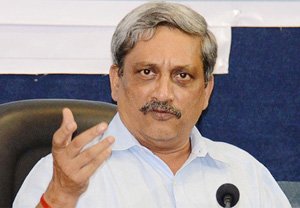New Delhi, Dec 12: Even as India will try to use diplomatic steps to avoid a confrontation with Pakistan, one needs to teach lessons to "those who are rogue", Defence Minister Manohar Parrikar said Friday.
Asked at the Aaj Tak-2014 conclave about the disturbances created by Pakistan along the border, he said India was not closing any options for "harsh measures".
"We are always prepared with counter measures. Eye for eye or 'eent ka jawab pathhar se' (befitting reply) appears to be an offensive statement. But ultimately, you have to teach a lesson to those who are rouge. "How do we do it is a part of strategy, and I won't reveal it here. But I am definitely not closing any ... harsh measures," Parrikar said. He, however, added that this was not the only option and India would also try diplomatic measures like exerting political and diplomatic pressure. "I know some people will say these have failed, have not yielded results, with a state like Pakistan where there is hardly any control by the political leadership. "These might have some meaning but I think there are some effective measures that can be preventive.
"There cannot be always defensive measures. We can have preventive measures. We need not wait for someone to attack," the minister said. Parrikar said the response from India had been strong and terrorists have been neutralised. "This year the number of neutralised terrorists is 102 compared to 66 last year. You can understand the level of engagements." He was asked about the risks of a nuclear conflict between India and Pakistan."Nuclear doctrine (advocates) restraint. I don't think any state can resort to it. A full-scale war can be linked to the nuclear aspect of it, but if there are places where you get terrorists across, there are people who do it. Those people will have to be pressurised," he said. "I am not talking about going across the border. Why not use the same people who attack us, as we say 'gun ka barrel ghuma do' (turn the barrel of the gun around)," he said.
The minister added that increasing the morale of the security forces and providing them better equipment was a priority. "The soldiers who neutralise terrorists at a height of 14,000 feet... Equip them properly. If we can give good boots to soldiers in Siachen, why not to these soldiers? "When they go on vacation after two years, are you aware there is not enough space to get them back in the aircraft available? "When you expect them to fight (at the border), their battle at home should be taken care of by the ministry," he said.
Observing that blacklisting was not the only solution, the Defence Minister said Italian defence multinational Finmeccanica, which was blacklisted, has so many subsidiaries and wondered was it viable not to buy arms from any one of them.
Expressing concern over death of army personnel in various accidents, Parrikar said he will not allow any carelessness.
"Give me sometime I will establish accountability. I cannot lose soldiers while loading the gun. Definitely no."
Asked whether the last 10 years were a lost decade in terms of modernisation of armed forces, he said, "It was a lost decade for defence forces but it was gain decade for many others."
On his predecessor A K Antony, Parrikar, who is an IIT graduate, said, "There is no solution only by remaining honest.
"I agree that Antony may have a clean image that does mean the reflection of cleanliness in the actual procurement.
"To remove dirt, you have to step into it," Parrikar said, adding he reads all the files and his engineering background at times helps him in understanding technical issues.
"I do not know how many ministers read files. I read files and raise many queries. I have been habitual reader. I can isolate the good part of it. I think once you have clean intentions or proper reasoning for all judgements, there can be no question of quality of the judgement," he added.
On implementation of the 'One Rank, One Pension' policy, Parrikar said an announcement will be made within next 4-8 weeks.
"I will not drag the issue for long. I will sort it out at the earliest. If I could take the satisfaction level (of the former armed personnel) to 80-90 per cent, that should be a good enough solution," he said.
'One Rank, One Pension' has been a long-standing demand of the over two million ex-servicemen of India. It seeks to ensure that a uniform pension is paid to the defence personnel retiring at the same rank with the same length of service, irrespective of their date of retirement.





Comments
Add new comment